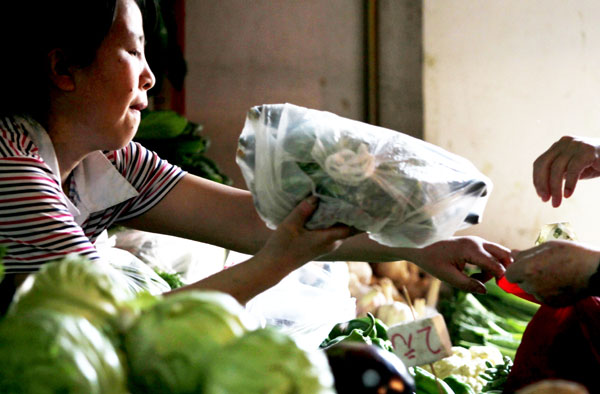Plastic bags get the China treatment in United Kingdom
By Chris Peterson (China Daily) Updated: 2015-10-31 08:02
 |
|
A vendor offers a free plastic bag as she sells vegetables in a market in the Chaoyang district of Beijing on May 28, 2011. [Photo by Wang Jing / China Daily] |
Plastic bags. It's hard to believe, but 40 years ago they were something of a novelty. In recent years, however, shops and supermarkets have got into the habit of handing them out at the drop of a hat for even the smallest of purchases. The result: they have become a major pollutant and a threat to wildlife.
The World Wide Fund for Nature estimates that more than 100,000 whales, seals and turtles die every year from either ingesting plastic bags or being ensnared by them. In India, about 20 cows die every day because of "eating" plastic bags. And in China, the local and global effect of discarded plastic bags is known as "white pollution".
The Pacific Ocean is home to a vast floating mass - the size of France - of discarded plastic packaging, including bags, which weigh 3 million tons. But now, from China to the United Kingdom, countries are slowly taking action to rid the world of the plague of plastic bags, many of which take years to decompose, if at all.
So let's take China.
Because of its sheer size and population, statistics out of China tend to be breathtaking. Bedevilled by blocked sewage systems and general plastic bag waste, the Beijing authorities decided drastic action was the way forward. An immediate ban on the use of ultra-thin plastic bags was introduced, and consumers were made to pay for every regular plastic bag issued by a store. Net result? China now uses 60 percent less plastic bags, a cut of roughly 40 billion bags a year.
Reviewing the government's action, the National Development and Reform Commission put the reduction in the use of plastic bags at 66 percent. Before the ban, China used an estimated 37 billion barrels of crude oil a year to produce plastic packaging.
Put another way, an average sedan could drive for about 11 metres on the amount of petrol needed to make one single plastic bag. You do the math, as our American cousins say.
Policing such policies isn't easy, and China has tackled the issue by assigning a 600,000-strong force of inspectors, who regularly monitor 250,000 retail stores and markets countrywide, generating about 2 million yuan ($314,600) in fines.
- After the plastic bag levy, there will be sustainable packaging
- Questions still remain over the effectiveness of plastic bag levy
- China's plastic bag ban saves 6m tons of oil
- More work needed to reduce plastic bag use
- China to tighten restrictions on plastic bag use
- Plastic bag ban yet to be enforced
- Plastic bag charge no longer carries weight, two years on

I’ve lived in China for quite a considerable time including my graduate school years, travelled and worked in a few cities and still choose my destination taking into consideration the density of smog or PM2.5 particulate matter in the region.











